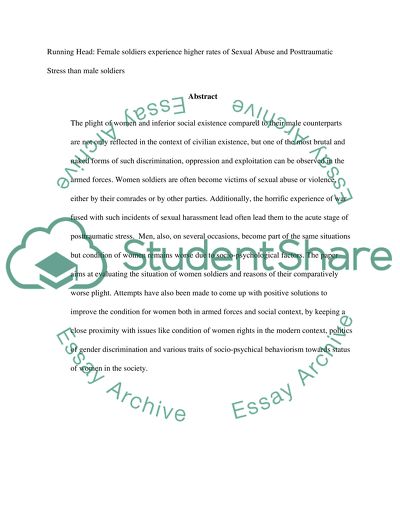Cite this document
(Female Soldiers Experience Assignment Example | Topics and Well Written Essays - 5000 words, n.d.)
Female Soldiers Experience Assignment Example | Topics and Well Written Essays - 5000 words. Retrieved from https://studentshare.org/sociology/1569782-female-soldiers-experience-higher-rates-of-sexual-abuse-and-posttraumatic-stress-than-male-soldiers
Female Soldiers Experience Assignment Example | Topics and Well Written Essays - 5000 words. Retrieved from https://studentshare.org/sociology/1569782-female-soldiers-experience-higher-rates-of-sexual-abuse-and-posttraumatic-stress-than-male-soldiers
(Female Soldiers Experience Assignment Example | Topics and Well Written Essays - 5000 Words)
Female Soldiers Experience Assignment Example | Topics and Well Written Essays - 5000 Words. https://studentshare.org/sociology/1569782-female-soldiers-experience-higher-rates-of-sexual-abuse-and-posttraumatic-stress-than-male-soldiers.
Female Soldiers Experience Assignment Example | Topics and Well Written Essays - 5000 Words. https://studentshare.org/sociology/1569782-female-soldiers-experience-higher-rates-of-sexual-abuse-and-posttraumatic-stress-than-male-soldiers.
“Female Soldiers Experience Assignment Example | Topics and Well Written Essays - 5000 Words”, n.d. https://studentshare.org/sociology/1569782-female-soldiers-experience-higher-rates-of-sexual-abuse-and-posttraumatic-stress-than-male-soldiers.


